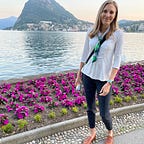Finding your way by knowing yourself
Edith Eger had lived in three countries before she was 12. All without leaving the town in which she was born. With the fall of the Austrian-Hungarian Empire, Kassa, a predominantly Hungarian town, was drawn within the borders of a new country and became Košice, Czechoslovakia. Facing discrimination from the majority Slovakian region, the population appealed to Budapest. In 1938, Hungary annexed the territory, and Edith and her family celebrated. She remembers dancing in her traditional Hungarian dress clothes and embracing Horthy as he visited her village, known as Kassa.
Edith grew up in a borderland. She spoke multiple languages and held a host of identities. As a young girl, she was a daughter, sister, dancer, gymnast, Hungarian, and Jew. Throughout her life, the experiences she had would multiply her identities. In her beautiful memoir, The Choice: Embrace the Possible, she writes, ‘Our painful experiences aren’t a liability–they’re a gift. They give us perspective and meaning, an opportunity to find our unique purpose and strength.’
The gas chambers of Auschwitz orphaned Edith as a teenager. She witnessed, firsthand, the greatest horrors humanity can inflict on each other. She carries the trauma with her. Yet she chooses not to let being a victim define her because to be a victim is to allow yourself to be defined by external forces.
‘A good definition of being a victim is when you keep the focus outside yourself, when you look outside yourself for someone to blame for your present circumstances, or to determine your purpose, fate, or worth.’
Edith was given two wonderful insights as a young girl that tethered her to the concept of internal identity. One day in ballet class, her teacher remarked, ‘All the ecstasy you will have in life will come from within.’ And on the road to Auschwitz, her mother taught her, ‘We don’t know where we are going, we don’t know what’s going to happen, but no one can take away from you what you put in your mind.’ The realization that joy and happiness are choices we make–not passive reactions to our experiences–is fundamental in creating an internal identity.
Dr. Edith Eva Eger became a world-renowned psychotherapist. When asked what the most common diagnosis among the people she treats, she answered, ‘I wouldn’t say depression or post-traumatic stress disorder, although those conditions are too common…No, I would say hunger. We are hungry. We are hungry for approval, attention, affection. We are hungry for the freedom to embrace life and to really know and be ourselves.’
Our identities that can be written on forms or bullet lists on our CVs are not unimportant. Yet to define ourselves exclusively by these prescribed, external identities, is to depend on society to define us. We must recognize the ability to choose for ourselves, craft our ideas, and make our own joy. Then we are not defined in opposition to another’s or melded to match those around us. Then we can navigate effectively in the borderlands.
When we know ourselves, we can encounter ideas that challenge us, people who are different from us, and places that are foreign to us. We can build bridges instead of walls because we won’t be pushing back on other things as a defense mechanism. Instead, we can lean forward and listen–without fear of falling over the chasm. We can change our minds. We can learn new things. We can hear ideas and choose not to believe them. Because we know who we are, we don’t get lost.
